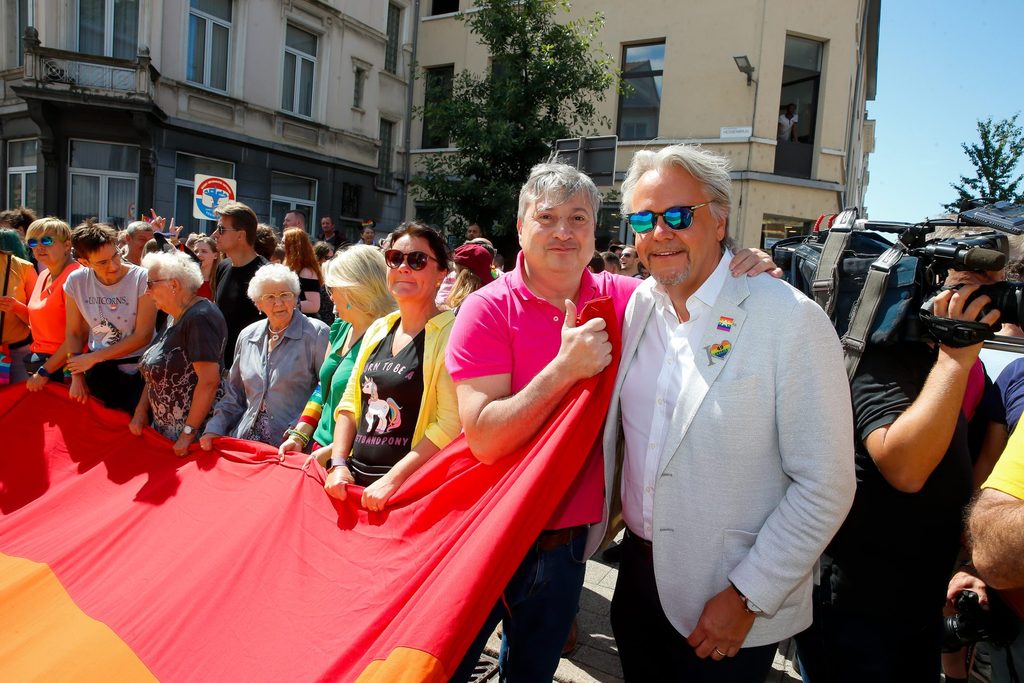The largest case ever heard on same-sex unions closed at the European Court of Human Rights (ECHR) on Tuesday, with the court deeming the lack of legal recognition of same-sex unions a violation of rights.
The Buhuceanu and Others v. Romania case saw 21 same-sex couples jointly launch a case against the Romanian government which offers no legal protection for LGBTQ families.
The ECHR ruled that Romania had a duty to provide recognition and protection to same-sex families, forming a legal precedent for all 46 ECHR countries – 15 of which still do not recognise same-sex partnerships. The court rejected the Romanian government's argument that private contracts could ensure the same level of protection for these families.
With 42 people having launched the case, this was the largest LGBTQ group to have ever sought the protection of their family life in the ECHR, according to leading LGBTQ association ACCEPT Romania which supported the families in the trial.
"This is an emotional decision for us as families", said the lead plaintiff Florin Buhuceanu in a press conference on Tuesday. "Imagine what it is like to live for 20 years with the person you love and never have the security that you can be next to them in a moment of need. This is the reality of LGBTQ people in Romania," said Buhuceanu's life partner Victor Ciobotaru.
Facebook post from ACCEPT Romania about one of the petitioning couples' story: "Cristina and Mihaela have lived in Timisoara with their family for the last 15 years. Their relationship was not recognised in Romania, so they had to get married in Iceland 6 years ago."
Several of the couples in the case have been together for over 15 years and encountered various problems due to the lack of recognition, such as being unprotected in the event of a medical emergency or a partner's death or difficulties accessing bank loans as a family and obtaining medical insurance.
"Since decriminalising same-sex relationships in 2001, the Romanian government has done nothing to ensure the protection of families in our community. On the contrary, it has sought to prohibit any form of recognition, despite the social reality in Romania," Buhuceanu said in 2020, in an interview with Romanian media.
A binding decision
Tuesday's ruling reinforces another ECHR decision from January: the Fedotova v. Russia case established a precedent for Russia to legally recognise same-sex couples. In March last year, Russia was excluded from the Council of Europe, in the wake of its invasion of Ukraine. Six months later, the country was no longer bound by the European Convention on Human Rights.
Russia is still legally obliged to implement rulings that have to do with violations that took place before the ECHR exit, but it is highly unlikely that the Fedotova decision will be respected. Vyacheslav Volodin, the Russian State Duma Speaker said that the ruling on same-sex unions directly contradicts the Constitution, values and traditions of Russia.
Romania is presently bound to the European Convention on Human Rights and Tuesday's decision is a step forward for the Romanian LGBTQ community. In response, Csaba Asztalos, the President of the country's National Council for Combating Discrimination stated that Parliament should enact a law on civil unions for same-sex and heterosexual couples alike. Asztalos did say that he is sceptical about lawmakers' willingness to do so in the context of the upcoming election year.
Related News
- LGBTQ community facing increased violence despite legal advances
- Belgium launches call for projects to increase LGBTQ visibility
ACCEPT Romania has already launched a petition requesting authorities to enact a legal framework for same-sex unions. "We will ensure that the Romanian state fully and wholly executes this decision", said the association's President Florina Presada. "There are hundreds of thousands of Romanian families who need this recognition. It is time for political parties to stop ignoring them."
The Romanian Orthodox Church came out strong in disapproval of the judgement and of any kind of civil union legislation, saying that it would "legalise concubinage" and would be "a damaging element to the spiritual and moral order of society".
Romania is one of 15 European countries which does not provide legal recognition to gay and lesbian couples. In the EU, only five other Member States outlaw same-sex civil unions: Poland, Slovakia, Hungary, Bulgaria and Lithuania. These five nations also limit marriage to heterosexual couples in their constitution.
In a related issue concerning LGBTQ families and same-sex parents, the Commission proposed last December a Council regulation on the recognition of parenthood between EU member states to ensure that the parenthood established in one EU member state is recognized in all other member states in order to protect children’s rights in cross-border situations and to facilitate family travel in the EU.
For the time being the Council is analysing the Commission’s proposal but the legislation is put on hold and any decision is not expected during the Swedish EU Presidency.
CORRECTION: A previous version of this article wrongly said that Russia withdrew from the Council of Europe and was longer bound by any obligations towards ECHR rulings.

